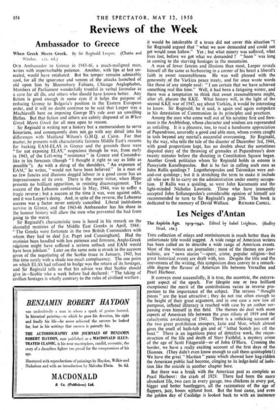Reviews of the Week
Ambassador to Greece
QuR Ambassador to Greece in 1943-46, a much-maligned man, writes with imperturbable patience. Another, with lips at last un- sealed, would have retaliated. But his temper remains admirably cool, for all the ignorance and venom of the attacks launched of old upon him by Bloomsbury Fabians, Chicago Anglophobes, Members of Parliament wonderfully trustful in verbal formulae as a cure for all ills, and others who should have known better. Any fiction is good enough in some eyes if it helps the purpose of reducing Greece to Bulgaria's position in the Eastern European order, and it will no doubt continue to be said that Leeper was a Machiavelli bent on imposing George ll's rule over an unwilling Hellas. But that fiction and others are calmly disposed of in When Greek Meets Greek for all men open to reason.
Sir Reginald is writing not a history but a memorandum to serve historians, and consequently does not.. go with any detail into his differences with Maitland Wilson's G.H.Q. at Cairo. For that matter, he presents with characteristic fairness Middle East's reasons for backing EAM-ELAS in Greece and the grounds there were " for not exposing ELAS," suspicious though he was, from early in 1943, of the Left-wing " resistance " in Greece and Cassandra- like in his forecasts (though " I thought it right to say as little as possible "). As with a shrug of the shoulders, " An exposure of EAM," he writes, " would not have been believed." In a man of so few fancies and illusions dogged labour in a good cause has an impressiveness of its own. There is the more virtue, when Hope presents no brilliant apparition, in resisting discouragement. The success of the Lebanon conference in May, 1944, was to suffer a tragic reverse ; but a success at the time it was, won against odds, and it was Leeper's doing. And, in spite of the reverse, the Lebanese success was factor never entirely cancelled. Liberal institutions survive in Greece, and the 1943-46 Ambassador has his share in the honour history will allow the men who prevented the bad from going to the worst.
Sir Reginald's characteristic tone is heard in his remark on the shameful mutinies of the Middle East Greeks in April, 1944: "The Greeks were fortunate in the two British Commanders with whom they had to deal [i.e. Paget and Cunningham]. Had the mutinies been handled with less patience and firmness, Anglo-Greek relations might have suffered a serious setback and EAM would have been jubilant." Later on the same note is struck in the account given of the negotiating of the Scobie truce in January, 1945, but this time surely with a shade too much complacency. The one point on which ELAS had refused to budge was the return of its hostages, and Sir Reginald tells us that his advice was that Scobie should give in—Scobie who a week before had declared : " The taking of civilian hostages is wholly contrary to the rules of civilised warfare ; it would be intolerable if a truce did not cover this situation "! Sir Reginald argued that " what we now demanded and could not get would soon follow." Yes ; but what misery was suffered, what lives lost, before we got what we demanded ? " Soon " was long in coming to the starving hostages in the mountains.
A man of fewer fancies and illusions than most, Leeper reveals himself all the same as harbouring in a corner of his heart a liberal's faith in sweet reasonableness. He was well pleased with the generosity of the Varkiza peace treaty, and for once wrote words like those of any simple-soul : " I am certain that we have achieved something real this time." Well, it had been a fatiguing winter, and there was a temptation to think that sweet reasonableness might, after all, placate the KKE. What history will, in the light of the second KKE war of 1947, say about Varkiza, it would be interesting to know. Sir Reginald, be it said, is again and again outspoken in his detestation of Communism in its principles and practices.
Among the men who come well out of his scrutiny first and fore- most is the Archbishop, whose character and wisdom are represented as unfailing. It is a pleasure, too, to read a handsome appreciation of Papandreou, assuredly a good and able man, whom events caught in toils beyond any mortal's successful overcoming. Sir Reginald, by the way, who tells the tale of the disaster of December 3rd, 1944, with good proportions kept, has no doubts about the sometimes disputed story of the throwing of grenades at Papandreou's door twenty minutes before the shooting in Constitution Square began. Another Greek politician whom Sir Reginald holds in esteem is Panayiotis Kanellopoulos. But is he fair in calling such men as John Rallis quislings ? Logothetopoulos and Tsironikos were out- and-out quislings ; but it is stretching the term to make it include all who saw fit to carry on the administration under enemy occupa- tion. If Rallis was a quisling, so were John Karamanis and the light-minded Nicholas Louvaris. Those who have innocently accepted John Sofianopoulos's considerable opinion of himself are recommended to turn to Sir Reginald's page 216. The book is dedicated to the memory of David Wallace. RICHARD CAPELL.






































 Previous page
Previous page